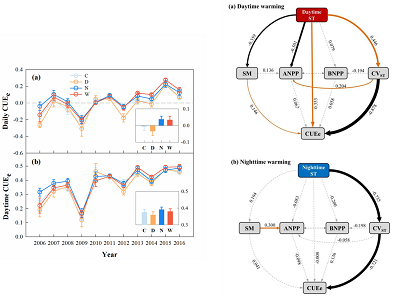On April 29, 2020, the research results of Professor Wan Shiqiang's team in the field of global change and carbon cycle were published online in Functional Ecology with the title "Nighttime warming enhances ecosystem carbon-use efficiency in a temperate steppe". The first author of the research paper is Wang Jing, a young teacher of the Global Change Ecology Laboratory, and the corresponding author is Professor Wan Shiqiang.
Since the industrial revolution, the impact of human activities has led to the intensification of global warming, and the rise of diurnal and night temperature has shown significant asymmetry, that is, the increase of the minimum temperature at night is significantly higher than the increase of the maximum temperature during the day. Previous studies on the impact of climate warming on the carbon cycle of ecosystems have mainly focused on the impact of daily average temperature rise, and it is still unknown whether the impact of daytime and nighttime warming on the carbon cycle is different, and whether the impact of climate warming is mainly driven by daytime or nighttime temperature rise. In this study, the responses of different levels of carbon use efficiency to diurnal asymmetric warming in ecosystems were explored by simulating day, night and all-day warming experiments in typical semi-arid grasslands in Inner Mongolia, China for 11 consecutive years. The results showed that nocturnal warming had no effect on the carbon use efficiency at the plant canopy level, but significantly improved the ecosystem carbon use efficiency, mainly because the nocturnal warming reduced the temporal and nighttime temperature variability, reduced ecosystem respiration, and improved the ecosystem carbon use efficiency, while daytime warming had no effect on the carbon use efficiency of plant canopy and ecosystem level. This study shows that there are significant differential effects of daytime and nighttime temperature rise on the ecosystem carbon cycle, and the impact of all-day warming is mainly driven by nighttime warming. In the future, under the trend of faster increase in nighttime minimum temperature, grassland ecosystems may further enhance their carbon sink function by improving the carbon use efficiency of ecosystems. (Link to paper: https://doi.org/10.1111/1365-2435.13579)

Effects of daytime and nighttime warming on carbon use efficiency of grassland ecosystems and potential process mechanisms

